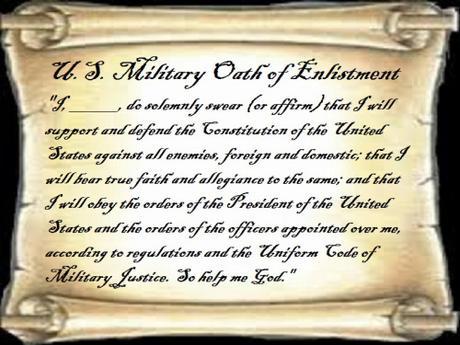
The Oath of Enlistment
I do solemnly swear (or affirm) that I will support and defend the Constitution of the United States against all enemies, foreign and domestic; that I will bear true faith and allegiance to the same; and that I will obey the orders of the President of the United States and the orders of the officers appointed over me, according to regulations and the Uniform Code of Military Justice.
Military discipline and effectiveness is built on the foundation of obedience to orders. Recruits are taught to obey, immediately and without question, orders from their superiors, right from day-one of boot camp.
Military members who fail to obey the lawful orders of their superiors risk serious consequences”
- Article 90 of the Uniform Code of Military Justice (UCMJ) makes it a crime for a military member to WILLFULLY disobey a superior commissioned officer. In fact, under Article 90, during times of war, a military member who willfully disobeys a superior commissioned officer can be sentenced to death.
- Article 91 makes it a crime to WILLFULLY disobey a superior Noncommissioned or Warrant Officer.
- Article 92 makes it a crime to disobey any lawful order (the disobedience does not have to be “willful” under this article).
Seems like pretty good motivation to obey any order you’re given, right? Nope. These articles require the obedience of LAWFUL orders. An order which is unlawful not only does not need to be obeyed, but obeying such an order can result in criminal prosecution of the one who obeys it. Military courts have long held that military members are accountable for their actions even while following orders — if the order was illegal.
“I was only following orders,” has been unsuccessfully used as a legal defense in hundreds of cases (probably most notably by Nazi leaders at the Nuremberg tribunals following World War II). The defense didn’t work for them, nor has it worked in hundreds of cases since.
The first recorded case of a United States Military officer using the “I was only following orders” defense dates back to 1799.
During the War with France, Congress passed a law making it permissible to seize ships bound to any French Port. However, when President John Adams wrote the order to authorize the U.S. Navy to do so, he wrote that Navy ships were authorized to seize any vessel bound for a French port, or traveling from a French port. Pursuant to the President’s instructions, a U.S. Navy captain seized a Danish Ship (the Flying Fish), which was en route from a French Port. The owners of the ship sued the Navy captain in U.S. maritime court for trespass. They won, and the United States Supreme Court upheld the decision. The U.S. Supreme Court held that Navy commanders “act at their own peril” when obeying presidential orders when such orders are illegal.
HAT-TIP to About.com
The NCOs in our military are the ones who suffer the most from orders that are questionable at best. They are responsible for directing the junior enlisted servicemen, who are most susceptible to following illegal orders. Pray for our small unit leaders and give them the courage they need to follow all lawful orders.
~Justin

